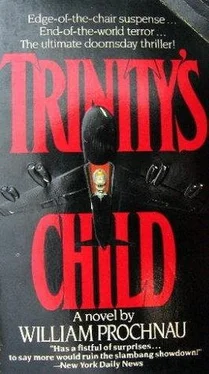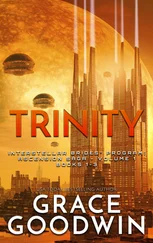Halupalai smiled faintly, almost unnoticeably. “Where you gonna go, commander?”
The question had an eerie ring, and it sent an alarm through Kazaklis. But he forced the super-con, Boom-Boom Room smile away, tightened his brotherly grip on Halupalai’s taut neck, and said cheerily, “You can pick the island, beachboy.” Kazaklis felt Halupalai’s tendons grow tighter.
“I didn’t mean to hurt him,” the gunner whispered, haunted.
“I know, pal,” Kazaklis said. “I know, I know.” He took Halupalai by both arms and pulled him away from the wall.
Kazaklis watched as Halupalai moved toward the cockpit, edging his way in a crab-walk, his back to the bulkhead, his arms still outstretched to feel his way, his eyes held unseeing far above the form beneath him. He saw Halupalai lower himself uneasily into the pilot’s seat and reach out tentatively to touch the one-fingered glove. Then Kazaklis went about his business, which was body stacking. Kazaklis struggled to get
Tyler’s corpse down the narrow ladder, thinking briefly of simply dropping it, and then, out of respect, dismissing the thought and doing it the hard way. At the bottom he dragged the limp heap, trying to avoid looking at the lolling head, and placed the navigator next to O’Toole. Then he moved Radnor, building a bleak pyramid in the narrow space leading to the sealed chamber holding their remaining bombs. He turned and went to Tyler’s seat. He sat down, and for no reson, sorted out the mess, stacking the jumbled papers, wetting his fingers and trying to erase the now dried spatters of blood. His eyes fastened unexpectedly on the hallowed Kodak print, a little boy staring round-eyed and worshipfully at him.
Suddenly he felt exhausted. He laid his head down on Tyler’s desktop and drifted into a fitful half-sleep. He saw Sarah Jean—rah! rah!—her breasts now tight little mailed fists flouncing beneath a soft sweater, her hand reaching toward his groin, clasping, pulling at a red lever. Nikko turned scrawny and old, taunting him with a lightning-bolt tongue. A little boy shivered in the rain, scrounging among the beetles, digging the life-giving pitch out of rotting hulks in a primeval swamp, feeding his precious find to the giant insects, and the pterodactyls devoured the white capsules he offered, swooped over the rubble of his splintered forest, arched triumphantly over the pulverized cities of his adulthood, their giant wings shrouds now, casting widening shadows as they dived into a flawless crater in which Halupalai lofted a perfect pass and Moreau leaped as the spheroid soared higher and farther—rah! rah!—and a little boy placed a match to a perfect teepee frame of the bulbous gray firewood the world had given him, and he built a fire in the rain.
“They’ll shoot you, general.”
“Sam.” Alice looked deeply into the troubled face of his colleague, seeing great pain, which he appreciated, and great doubt, which he understood. “Sam, I should find such an angel of mercy.”
The general turned briefly away, reached into the satchel at his side, and withdrew the special-issue revolver he had carried since he won his first star. He looked at it fondly. It was a general officer’s tool never used. He felt every eye in the Looking Glass on him now, but he had no sense of embarrassment at all.
“You know, Sam,” Alice said thoughtfully, “they tell us at West Point that every war is made up of a million private wars. They tell us only once, because no officer likes it that way. Not very disciplined, private wars.” He paused and sighed. “I’ve just fought mine. As God is my witness, I don’t know if I won or lost.”
“Ten of our bombers, general,” Sam said quietly. “What does it mean? You can’t call back the submarines. You can’t hold the rest of the world together.” The voice turned beseeching and Alice knew that Sam’s war was raging now. “It won’t change anything, general.”
“Change anything?” Alice sounded detached, even to himself. “I don’t believe that’s what private wars are all about, Sam.”
Alice felt the finely etched security of the gun handle in his palm. Then he flipped the weapon neatly, catching it by the barrel, and placed it atop the code box. He stood, perfectly erect, and held unflinching eyes on his friend and subordinate.
“I just gave you an order, Sam,” he said firmly. “Just disobeyed one, too. First in more than thirty years. I’m tired. I’m going back to lie down.” He started to turn. “I’ll understand, warrior,” he added. Then he walked out of the compartment, into the aircraft’s rear cabin, and lay down on its single cot, his back turned toward a doorway intentionally left open.
“It wasn’t your fault, good friend,” Moreau said in a voice that washed over Halupalai in the same massaging rhythm of the airplane’s vibrations, the same rhythm of her fingers.
Halupalai was unaccustomed to the front seat and equally unaccustomed to the comfort of a woman’s hand. When he first came up front, he had said nothing. Then he had begun to babble, gushing all the guilt of a lifetime at the woman kneading his shoulders. But now he sensed that Moreau was having no easier time than he. That added to his guilt, but he tried to pull himself together.
“I didn’t mean it to be that way with Tyler,” he said, painfully firming up his voice.
Moreau looked at him in anguish. Halupalai had sensed correctly that she was having trouble, and not simply with the task of calming him. “You saved us,” she said. The words sounded hollow, even to her. In some unfathomable way, she was finding the turnabout run more difficult than the plunge into Russia. They had programmed her to die, not to live, not to deal with the new problems of surviving. She tried to finish her thought. “Tyler went crazy.”
Halupalai looked at her with a strange childlike expression. “Is it all right to kill crazy people now?” The look on Moreau’s face turned from anguish to raw pain. Halupalai floundered. He wanted away from the subject. He wanted to tell her something else, but he didn’t know how.
“Moreau…?”
She sighed and squeezed his shoulder lightly.
“Moreau,” he continued tentatively, “you shouldn’t fight with Kazakhs all the time. He’s really okay.”
Moreau’s fingers tightened noticeably on his shoulder, but he went on.
“He’s got a side he never lets you see.”
She said nothing.
“Please, Moreau. It’s important.”
“I know,” Moreau finally replied. “We’ve all got that side, Halupalai.”
“Please,” he insisted.
She stared hard into Halupalai’s open face. He sounded as if he were writing his will. She shivered, and then she nodded and patted his shoulder reassuringly. He smiled. They both went silent, each into a separate world, and Moreau felt the shame and guilt well up, only to be replaced by fear—a great fear of a new unknown. Until now her future had been ordained and simple—a robot pilot’s death in the death of a doomed world. It no longer was quite that simple, and the simplicity suddenly seemed cleaner, preferable. What kind of void was she entering now, with what kind of shadow of a man? Could she survive in this new wilderness? Did she want to survive? Did she want to walk into the new emptiness with a man whose other side she had never seen? She shuddered, realizing shamefully that her mind had cut Halupalai out of that world. She reached for him. But he was gone, having shuffled silently back to his proper place in the dark redness. She was very afraid. Where was Kazakhs? He seemed to have been gone forever.
Sedgwick felt something jabbing at him. He didn’t want to awaken. He was very comfortably, sleepily cold. He brushed at the irritant, the pain from his hands racking him out of his grogginess. His hands hurt more than his broken legs now. Near him he heard brush crackle, snow crunch, as something suddenly withdrew from him.
Читать дальше












